Unit 3 Could you please tell me where the restrooms are?Section B(2a-3b)课件(30张PPT)
文档属性
| 名称 | Unit 3 Could you please tell me where the restrooms are?Section B(2a-3b)课件(30张PPT) | 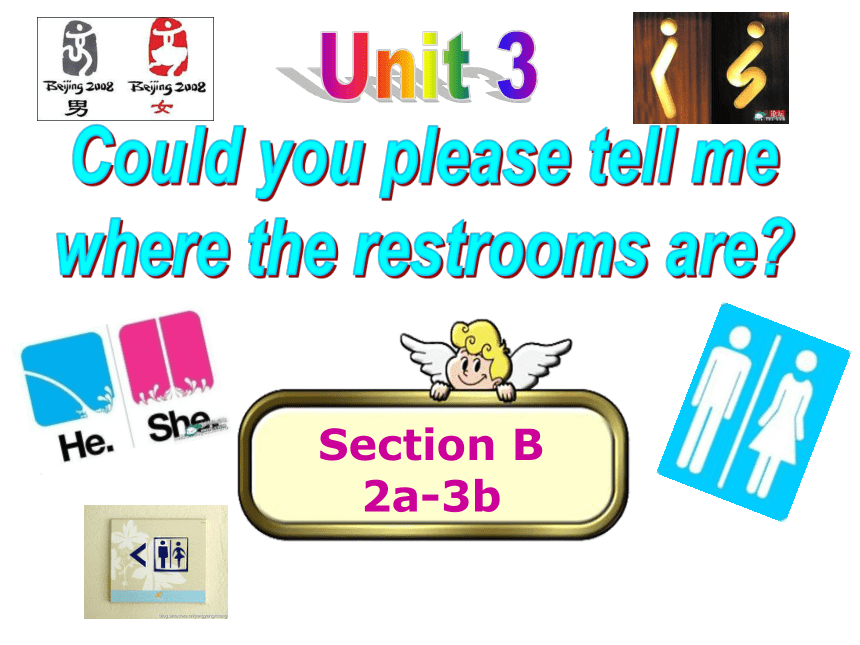 | |
| 格式 | zip | ||
| 文件大小 | 3.2MB | ||
| 资源类型 | 教案 | ||
| 版本资源 | 人教新目标(Go for it)版 | ||
| 科目 | 英语 | ||
| 更新时间 | 2018-10-13 22:50:18 | ||
图片预览


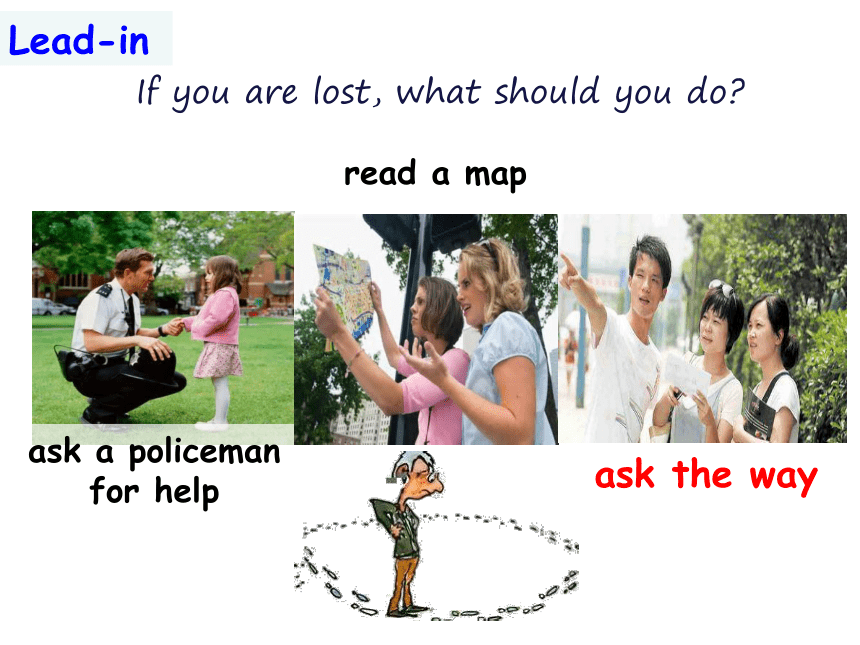
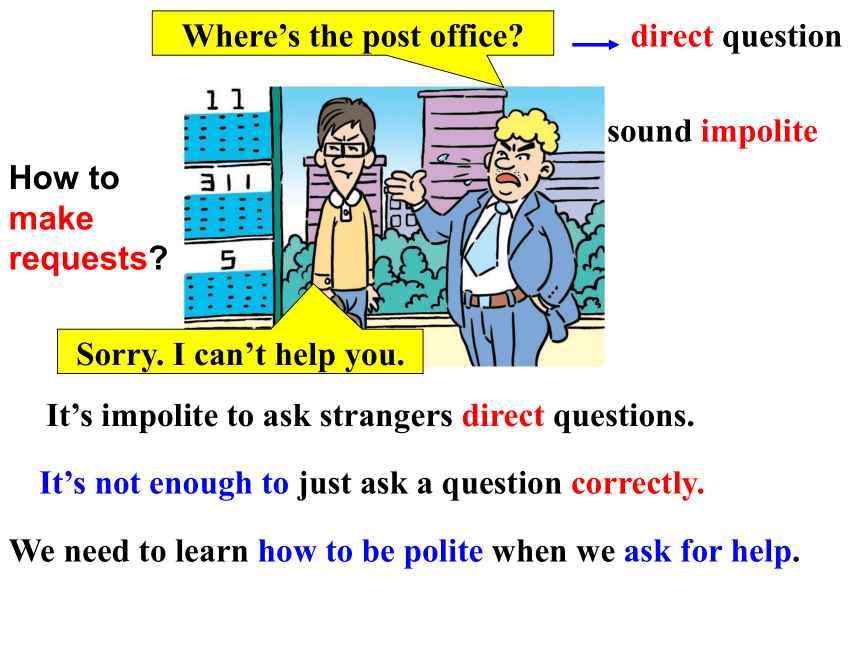
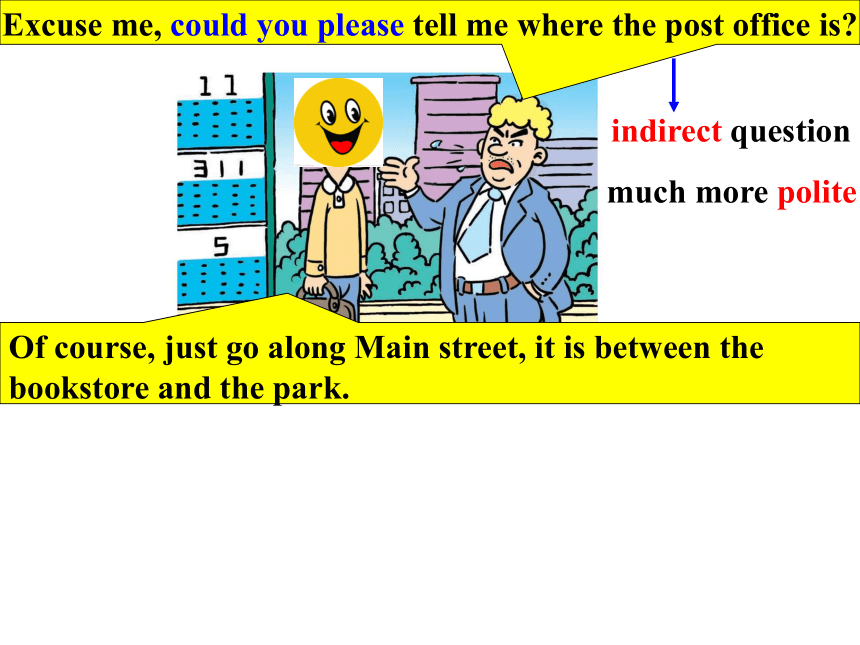
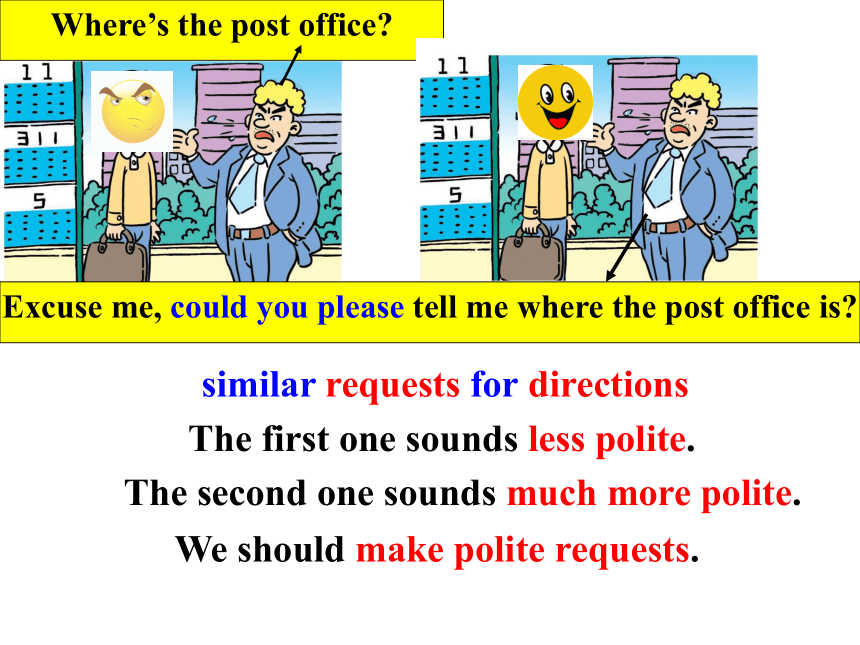
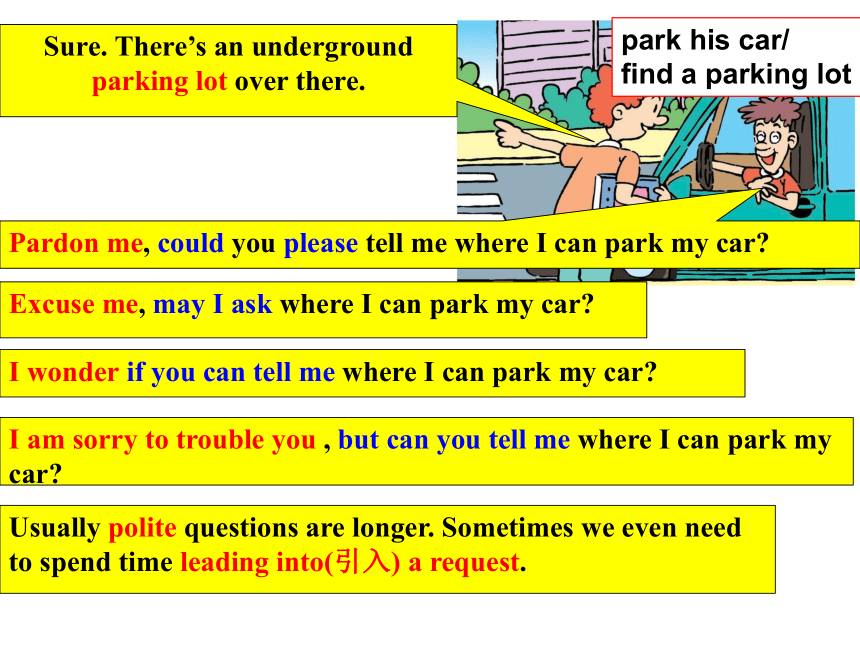
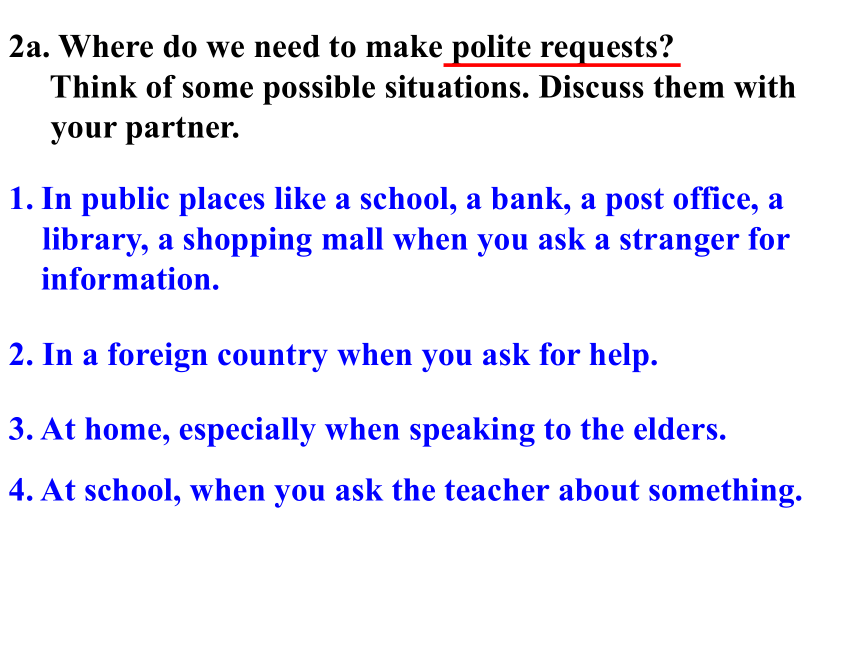
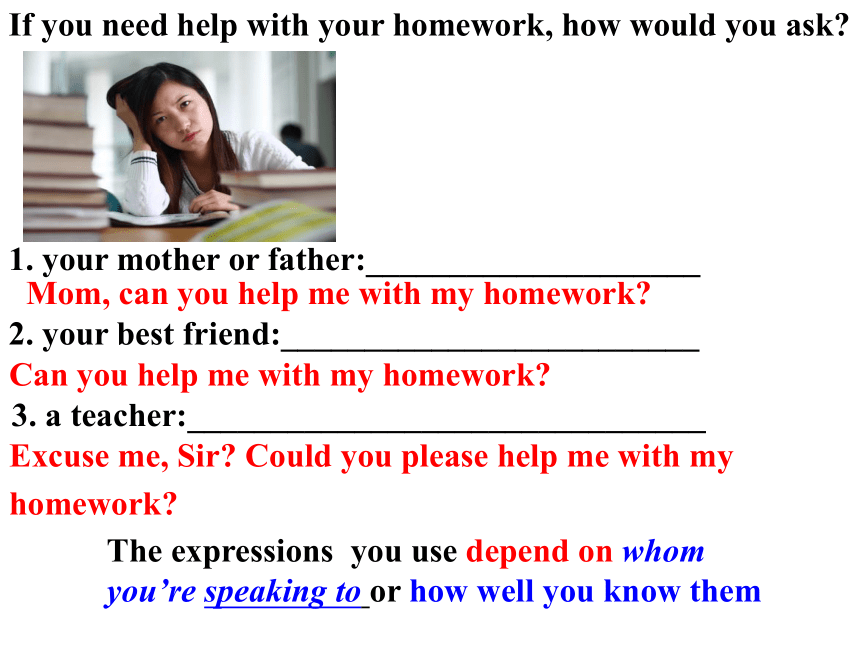
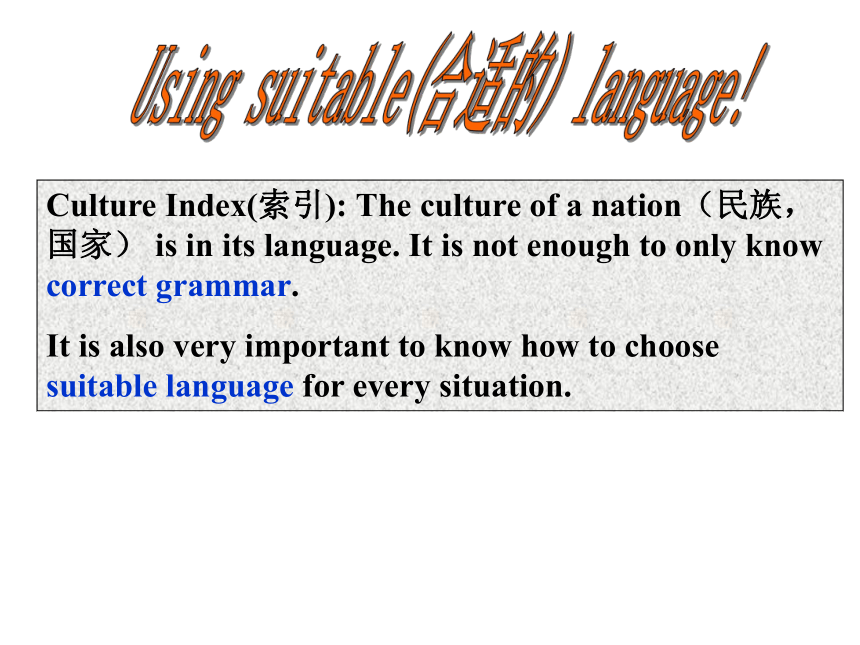
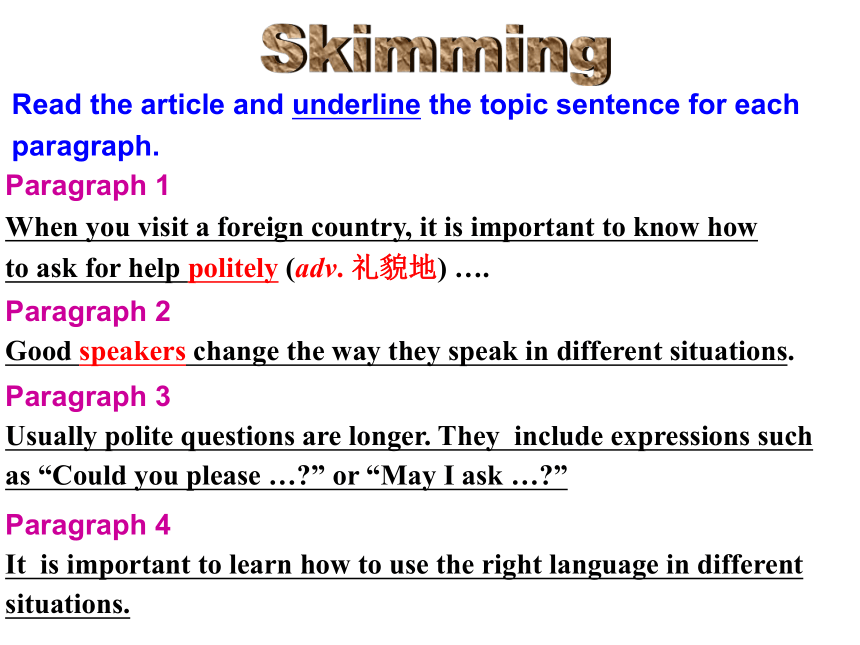
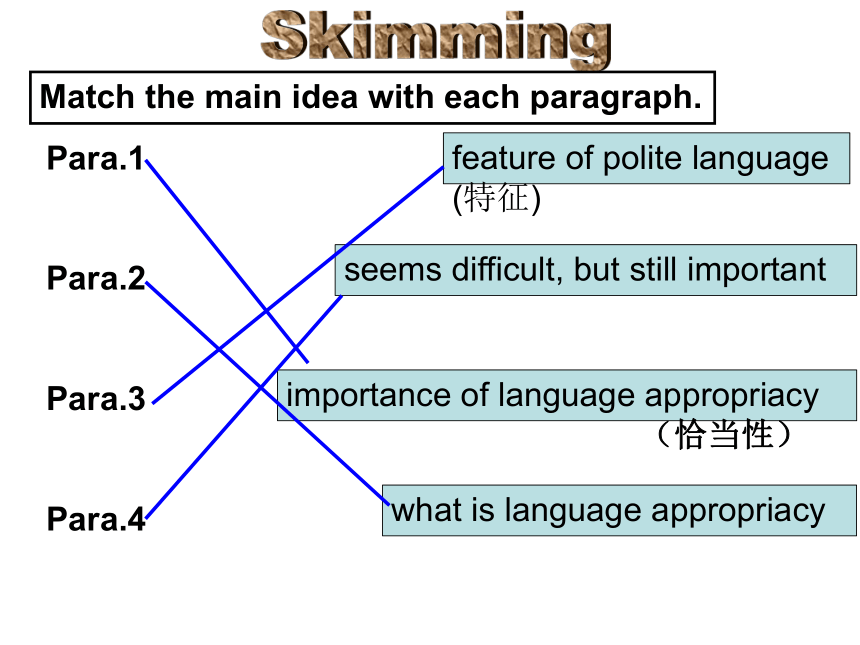
文档简介
politely
direction
request
correct
polite
direct
speaker
whom
impolite
address
underground
parking lot
adv. 礼貌地;客气地
n. 方向;方位
n.&v. 要求;请求
adj. 正确的;恰当的
adj. 有礼貌的;客气的
adj. 直接的;直率的
n. 讲(某种语言的人)
pron. 谁;什么人
adj. 不礼貌的
n. 住址;地址;通讯处
adj. 地下的;n. 地铁
停车场;停车区
If you are lost, what should you do?
ask a policeman for help
Lead-in
read a map
ask the way
Where’s the post office?
It’s impolite to ask strangers direct questions.
direct question
Sorry. I can’t help you.
We need to learn how to be polite when we ask for help.
It’s not enough to just ask a question correctly.
sound impolite
How to
make
requests?
Excuse me, could you please tell me where the post office is?
indirect question
Of course, just go along Main street, it is between the bookstore and the park.
much more polite
Where’s the post office?
Excuse me, could you please tell me where the post office is?
similar requests for directions
The first one sounds less polite.
The second one sounds much more polite.
We should make polite requests.
Pardon me, could you please tell me where I can park my car?
Sure. There’s an underground parking lot over there.
Excuse me, may I ask where I can park my car?
I wonder if you can tell me where I can park my car?
I am sorry to trouble you , but can you tell me where I can park my car?
Usually polite questions are longer. Sometimes we even need to spend time leading into(引入) a request.
park his car/
find a parking lot
2a. Where do we need to make polite requests?
Think of some possible situations. Discuss them with
your partner.
In public places like a school, a bank, a post office, a
library, a shopping mall when you ask a stranger for information.
2. In a foreign country when you ask for help.
3. At home, especially when speaking to the elders.
4. At school, when you ask the teacher about something.
If you need help with your homework, how would you ask?
1. your mother or father:____________________
2. your best friend:_________________________
3. a teacher:_______________________________
The expressions you use depend on whom
you’re speaking to or how well you know them
Mom, can you help me with my homework?
Can you help me with my homework?
Excuse me, Sir? Could you please help me with my
homework?
Culture Index(索引): The culture of a nation(民族,国家) is in its language. It is not enough to only know correct grammar.
It is also very important to know how to choose suitable language for every situation.
Read the article and underline the topic sentence for each paragraph.
Paragraph 1
When you visit a foreign country, it is important to know how to ask for help politely (adv. 礼貌地) ….
Paragraph 2
Good speakers change the way they speak in different situations.
Paragraph 3
Usually polite questions are longer. They include expressions such as “Could you please …?” or “May I ask …?”
Paragraph 4
It is important to learn how to use the right language in different situations.
importance of language appropriacy
(恰当性)
what is language appropriacy
feature of polite language
(特征)
seems difficult, but still important
Para.1
Para.2
Para.3
Para.4
Match the main idea with each paragraph.
These two ways are similar __________ for _________ .They are both _________.The first one sounds _________ , because it is very _______.The second one sounds __________.
Where are the restrooms?
less polite
direct
correct
more polite
Read Paragraph 1 and finish it
Could you please tell me where the restrooms are?
What do we need to do when we ask for help?
2. We also need to _____________________ .
requests
directions
1. It’s not enough to _____________________.
ask a question correctly
learn how to be polite
Read Paragraph 2 and answer
When is the school trip?
Excuse me, Mr. West. Do you know when the school trip is?
Which way is suitable(合适的) for your friends or classmates?
Which is suitable for your teacher?
It’s all right to ask your classmates ________ questions. Why?
The expressions we use might depend on __________________ or _______________________.
direct
However, if you speak to your teacher, you should
use __________________ expressions.
much more polite
whom we are speaking to
how well we know each other
Because you know them well.
Usually polite questions are ______. They ______ expressions such as “__________________” or “__________”
Read Paragraph 3 and finish the blanks
longer
include
Could you please …
May I ask…
Give an example for “tell me your hobby.”
Sometimes we even need to spend time
______________________ a request.
leading into(引入,导入)
“_____________________________________” or “______________________________________” before asking for help.
Peter, could you please tell me your e-mail address?
Peter, tell me your e-mail address.
Excuse me, I wonder if you can help me
I’m sorry to trouble to trouble you, but…
It seems ___________ to speak ______ than _______,
but it is still important _________________________.
Why?
Read Paragraph 4 and answer
This will help you communicate better with other people.
I wonder if you can tell me what you have
learned from this passage.
Using Suitable language
In different situations, you need to choose and use suitable language based on cultural knowledge.
more difficult
politely
directly
to learn how to use the right language in difficult situations
J: Jason A: Anna
J: Is it important to know ________________________?
A: Of course. It is not enough to ______________________.
J: I agree with you. We also need to learn
__________________________________.
A: Good speakers change the way they speak in different situations. The expressions they use might depend on
_______________________________________________
how to ask for help politely
just ask a question correctly
how to be polite when we ask for help
whom they are speaking to or how well they know each other
And direct questions sounds _________. Usually polite questions are longer. Sometimes we need to _________
____________________.
J: It might seem more difficult to ___________________
_______ .But using the right language in different situations will help you ____________________________.
_________________________________.
less polite
spend time
leading into a request
speak politely than
directly
communicate better with others
Jason is talking about polite requests with his friend Anna. Complete their conversations using the words on page 22.
2c Find all the direct questions and polite requests from the passage.
Where are the restrooms?
Could you tell me where the restrooms are?
When is the school trip?
Excuse me, Mr. West.
Do you know when the
school trip is?
Peter, could you please tell me your e-mail address?
Where is the post office?
Direct questions Polite requests
1.
2.
3.
1.
2.
3.
A
kitchen, restaurant
B
street
A/B
any public place, home
B
street
2d
B
A
B
movie theater,
concert hall
home
street
Request Person Place
1. Will you pass the salt?
2. Do you know where I can change some money, please?
3. Could you tell me what just happened?
4. Can you please tell me where the nearest station is?
5. Excuse me, do you know what time it begins, please?
6. Let me know when you’re ready, OK?
7.Could you possibly tell me the way to the village school?
By adding “excuse me” or “pardon me” at the beginning of the question
By using “could” instead of “can” in question
By adding “please” at the end of a question
How can we make direct questions polite?
When you visit a _______ country, it is _________ to know how to ask for help _______. For example, “Where are the restrooms?” or “Could you ______ tell me where the __________ ___?” These are similar ________ for _________ you may ask. We also need to learn how to be _______when we ask for _____.
In English, ___ in Chinese, we change the way we ______ in different _________.The expressions you use might _______ ___ whom you are ____________ or how well you know them.
foreign
important
politely
please
restrooms are
requests
directions
Fill in blanks according to 2b.
help
like
speak
situations
on
depend
polite
speaking to
If you say to your teacher, “When is the school trip?”, this might sound ________. But if you say, “Excuse me, Mr. West. Do you know when ______________?”, this will sound _______ more polite. However, it is all right to ask your classmates __________
because you know them ______.
It might seem more _________ to speak _______than _________. It is important to learn how to use ______ ________ in different situations. This will also help you _____________ better with other people.
impolite
the school trip is
much
well
language
difficult
directly
right
communicate
direct questions
politely
3a
The course you will study
2. The time of the course
Q: Excuse me, can you tell me what course I will study?
Q: Excuse me, could you please send me the introduction of the course?
Q: Excuse me, can you tell me how long the course lasts?
Q: Pardon me, could you please tell me when the course will start?
3. Where and what you can eat
Q: Excuse me, would you mind telling me where and what I can eat?
Q: Excuse me, do you know where students usually eat and what kind of food they eat?
Q: Excuse me, do you know where I will stay?
4. Where you will stay
Q: Excuse me, could I find out more about where students can stay?
5. What activities you can do
6. Travel to the school
7. Other
Q: Excuse me, can you tell me what activities I can do?
Q: Excuse me, could you tell me the kinds of activities students can do?
Q: Pardon me, could you please tell me how to get to school?
Q: Pardon me, could you please tell me how students usually travel to school?
Q: Pardon me, could you please tell me how much the course costs?
3b
Write a polite letter to the school asking for the information you want to know. Use your notes in 3a.
In your letter, you should:
﹡introduce yourself
﹡say when you are coming
﹡politely ask for information
﹡thank the person for helping you
Use the following expressions to help you:
My name is … and I’m from …
I’ll be coming to your school for …
I’d like to know about …
I would like to thank you for …
I’m looking forward to your reply.
Dear Sir/ Madam,
My name is Li Jie and I’m from Beijing, China. I’m coming to your school for a short study vacation this year. I’d like to know more about your school and the course I can take.
First, I would like to find out exactly how long the course is and when it will begin. I wonder if you could send me the course outline and some information about the course fees.
Could you please also give me some information about student housing and transport to your school? In addition, it would be interesting for me to know about the activities that students can take part in and the places where they can hang out and have their meals after school.
I would like to thank you for your help and I’m looking forward to your reply.
Yours faithfully,
Li Jie
Dear Sir or Madam,
I’ll be coming to your school soon for a short study vacation. I will leave for your school on July 10th.
I am a boy from China. I am in Grade Nine. I like English and I also enjoy doing sports. I am glad that I can study in your school. I’d like to know more information about the school. Could you tell me what course I will study in your school? And I also want to know when the course will start. I want to know where I will stay. Can you tell me? Would you mind telling me where and what I can eat in your school? I like all kinds of activities. Could you please tell me what activities I can do in your school? The last question, can you tell me how I can get to your school?
I would like to thank you for helping me and I look forward to your reply.
Yours faithfully,
He Wei
根据3b的内容写一封回信。
direction
request
correct
polite
direct
speaker
whom
impolite
address
underground
parking lot
adv. 礼貌地;客气地
n. 方向;方位
n.&v. 要求;请求
adj. 正确的;恰当的
adj. 有礼貌的;客气的
adj. 直接的;直率的
n. 讲(某种语言的人)
pron. 谁;什么人
adj. 不礼貌的
n. 住址;地址;通讯处
adj. 地下的;n. 地铁
停车场;停车区
If you are lost, what should you do?
ask a policeman for help
Lead-in
read a map
ask the way
Where’s the post office?
It’s impolite to ask strangers direct questions.
direct question
Sorry. I can’t help you.
We need to learn how to be polite when we ask for help.
It’s not enough to just ask a question correctly.
sound impolite
How to
make
requests?
Excuse me, could you please tell me where the post office is?
indirect question
Of course, just go along Main street, it is between the bookstore and the park.
much more polite
Where’s the post office?
Excuse me, could you please tell me where the post office is?
similar requests for directions
The first one sounds less polite.
The second one sounds much more polite.
We should make polite requests.
Pardon me, could you please tell me where I can park my car?
Sure. There’s an underground parking lot over there.
Excuse me, may I ask where I can park my car?
I wonder if you can tell me where I can park my car?
I am sorry to trouble you , but can you tell me where I can park my car?
Usually polite questions are longer. Sometimes we even need to spend time leading into(引入) a request.
park his car/
find a parking lot
2a. Where do we need to make polite requests?
Think of some possible situations. Discuss them with
your partner.
In public places like a school, a bank, a post office, a
library, a shopping mall when you ask a stranger for information.
2. In a foreign country when you ask for help.
3. At home, especially when speaking to the elders.
4. At school, when you ask the teacher about something.
If you need help with your homework, how would you ask?
1. your mother or father:____________________
2. your best friend:_________________________
3. a teacher:_______________________________
The expressions you use depend on whom
you’re speaking to or how well you know them
Mom, can you help me with my homework?
Can you help me with my homework?
Excuse me, Sir? Could you please help me with my
homework?
Culture Index(索引): The culture of a nation(民族,国家) is in its language. It is not enough to only know correct grammar.
It is also very important to know how to choose suitable language for every situation.
Read the article and underline the topic sentence for each paragraph.
Paragraph 1
When you visit a foreign country, it is important to know how to ask for help politely (adv. 礼貌地) ….
Paragraph 2
Good speakers change the way they speak in different situations.
Paragraph 3
Usually polite questions are longer. They include expressions such as “Could you please …?” or “May I ask …?”
Paragraph 4
It is important to learn how to use the right language in different situations.
importance of language appropriacy
(恰当性)
what is language appropriacy
feature of polite language
(特征)
seems difficult, but still important
Para.1
Para.2
Para.3
Para.4
Match the main idea with each paragraph.
These two ways are similar __________ for _________ .They are both _________.The first one sounds _________ , because it is very _______.The second one sounds __________.
Where are the restrooms?
less polite
direct
correct
more polite
Read Paragraph 1 and finish it
Could you please tell me where the restrooms are?
What do we need to do when we ask for help?
2. We also need to _____________________ .
requests
directions
1. It’s not enough to _____________________.
ask a question correctly
learn how to be polite
Read Paragraph 2 and answer
When is the school trip?
Excuse me, Mr. West. Do you know when the school trip is?
Which way is suitable(合适的) for your friends or classmates?
Which is suitable for your teacher?
It’s all right to ask your classmates ________ questions. Why?
The expressions we use might depend on __________________ or _______________________.
direct
However, if you speak to your teacher, you should
use __________________ expressions.
much more polite
whom we are speaking to
how well we know each other
Because you know them well.
Usually polite questions are ______. They ______ expressions such as “__________________” or “__________”
Read Paragraph 3 and finish the blanks
longer
include
Could you please …
May I ask…
Give an example for “tell me your hobby.”
Sometimes we even need to spend time
______________________ a request.
leading into(引入,导入)
“_____________________________________” or “______________________________________” before asking for help.
Peter, could you please tell me your e-mail address?
Peter, tell me your e-mail address.
Excuse me, I wonder if you can help me
I’m sorry to trouble to trouble you, but…
It seems ___________ to speak ______ than _______,
but it is still important _________________________.
Why?
Read Paragraph 4 and answer
This will help you communicate better with other people.
I wonder if you can tell me what you have
learned from this passage.
Using Suitable language
In different situations, you need to choose and use suitable language based on cultural knowledge.
more difficult
politely
directly
to learn how to use the right language in difficult situations
J: Jason A: Anna
J: Is it important to know ________________________?
A: Of course. It is not enough to ______________________.
J: I agree with you. We also need to learn
__________________________________.
A: Good speakers change the way they speak in different situations. The expressions they use might depend on
_______________________________________________
how to ask for help politely
just ask a question correctly
how to be polite when we ask for help
whom they are speaking to or how well they know each other
And direct questions sounds _________. Usually polite questions are longer. Sometimes we need to _________
____________________.
J: It might seem more difficult to ___________________
_______ .But using the right language in different situations will help you ____________________________.
_________________________________.
less polite
spend time
leading into a request
speak politely than
directly
communicate better with others
Jason is talking about polite requests with his friend Anna. Complete their conversations using the words on page 22.
2c Find all the direct questions and polite requests from the passage.
Where are the restrooms?
Could you tell me where the restrooms are?
When is the school trip?
Excuse me, Mr. West.
Do you know when the
school trip is?
Peter, could you please tell me your e-mail address?
Where is the post office?
Direct questions Polite requests
1.
2.
3.
1.
2.
3.
A
kitchen, restaurant
B
street
A/B
any public place, home
B
street
2d
B
A
B
movie theater,
concert hall
home
street
Request Person Place
1. Will you pass the salt?
2. Do you know where I can change some money, please?
3. Could you tell me what just happened?
4. Can you please tell me where the nearest station is?
5. Excuse me, do you know what time it begins, please?
6. Let me know when you’re ready, OK?
7.Could you possibly tell me the way to the village school?
By adding “excuse me” or “pardon me” at the beginning of the question
By using “could” instead of “can” in question
By adding “please” at the end of a question
How can we make direct questions polite?
When you visit a _______ country, it is _________ to know how to ask for help _______. For example, “Where are the restrooms?” or “Could you ______ tell me where the __________ ___?” These are similar ________ for _________ you may ask. We also need to learn how to be _______when we ask for _____.
In English, ___ in Chinese, we change the way we ______ in different _________.The expressions you use might _______ ___ whom you are ____________ or how well you know them.
foreign
important
politely
please
restrooms are
requests
directions
Fill in blanks according to 2b.
help
like
speak
situations
on
depend
polite
speaking to
If you say to your teacher, “When is the school trip?”, this might sound ________. But if you say, “Excuse me, Mr. West. Do you know when ______________?”, this will sound _______ more polite. However, it is all right to ask your classmates __________
because you know them ______.
It might seem more _________ to speak _______than _________. It is important to learn how to use ______ ________ in different situations. This will also help you _____________ better with other people.
impolite
the school trip is
much
well
language
difficult
directly
right
communicate
direct questions
politely
3a
The course you will study
2. The time of the course
Q: Excuse me, can you tell me what course I will study?
Q: Excuse me, could you please send me the introduction of the course?
Q: Excuse me, can you tell me how long the course lasts?
Q: Pardon me, could you please tell me when the course will start?
3. Where and what you can eat
Q: Excuse me, would you mind telling me where and what I can eat?
Q: Excuse me, do you know where students usually eat and what kind of food they eat?
Q: Excuse me, do you know where I will stay?
4. Where you will stay
Q: Excuse me, could I find out more about where students can stay?
5. What activities you can do
6. Travel to the school
7. Other
Q: Excuse me, can you tell me what activities I can do?
Q: Excuse me, could you tell me the kinds of activities students can do?
Q: Pardon me, could you please tell me how to get to school?
Q: Pardon me, could you please tell me how students usually travel to school?
Q: Pardon me, could you please tell me how much the course costs?
3b
Write a polite letter to the school asking for the information you want to know. Use your notes in 3a.
In your letter, you should:
﹡introduce yourself
﹡say when you are coming
﹡politely ask for information
﹡thank the person for helping you
Use the following expressions to help you:
My name is … and I’m from …
I’ll be coming to your school for …
I’d like to know about …
I would like to thank you for …
I’m looking forward to your reply.
Dear Sir/ Madam,
My name is Li Jie and I’m from Beijing, China. I’m coming to your school for a short study vacation this year. I’d like to know more about your school and the course I can take.
First, I would like to find out exactly how long the course is and when it will begin. I wonder if you could send me the course outline and some information about the course fees.
Could you please also give me some information about student housing and transport to your school? In addition, it would be interesting for me to know about the activities that students can take part in and the places where they can hang out and have their meals after school.
I would like to thank you for your help and I’m looking forward to your reply.
Yours faithfully,
Li Jie
Dear Sir or Madam,
I’ll be coming to your school soon for a short study vacation. I will leave for your school on July 10th.
I am a boy from China. I am in Grade Nine. I like English and I also enjoy doing sports. I am glad that I can study in your school. I’d like to know more information about the school. Could you tell me what course I will study in your school? And I also want to know when the course will start. I want to know where I will stay. Can you tell me? Would you mind telling me where and what I can eat in your school? I like all kinds of activities. Could you please tell me what activities I can do in your school? The last question, can you tell me how I can get to your school?
I would like to thank you for helping me and I look forward to your reply.
Yours faithfully,
He Wei
根据3b的内容写一封回信。
同课章节目录
- Unit 1 How can we become good learners.
- Section A
- Section B
- Unit 2 I think that mooncakes are delicious!
- Section A
- Section B
- Unit 3 Could you please tell me where the restroom
- Section A
- Section B
- Unit 4 I used to be afraid of the dark.
- Section A
- Section B
- Unit 5 What are the shirts made of?
- Section A
- Section B
- Review of Units 1-5
- Unit 6 When was it invented?
- Section A
- Section B
- Unit 7 Teenagers should be allowed to choose their
- Section A
- Section B
- Unit 8 It must belong to Carla.
- Section A
- Section B
- Unit 9 I like music that I can dance to.
- Section A
- Section B
- Unit 10 You're supposed to shake hands.
- Section A
- Section B
- Review of Units 6-10
- Unit 11 Sad movies make me cry.
- Section A
- Section B
- Unit 12 Life is full of the unexpected
- Section A
- Section B
- Unit 13 We're trying to save the earth!
- Section A
- Section B
- Unit 14 I remember meeting all of you in Grade 7.
- Section A
- Section B
- Review of Units 11-14
